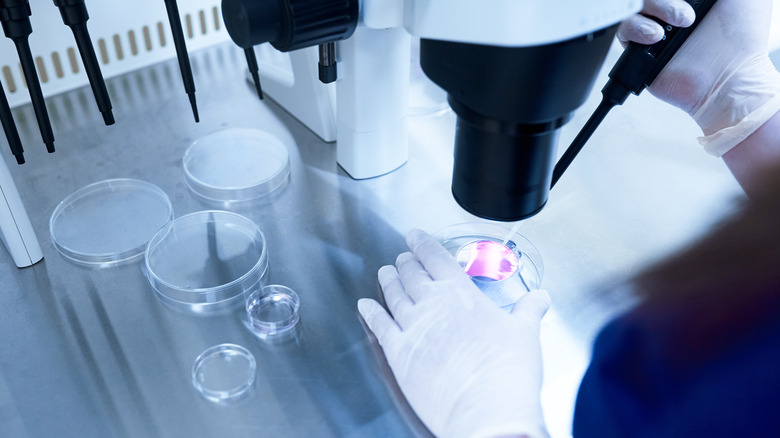How The Roe V. Wade Overturn Could Affect IVF
The Supreme Court overturned Roe v. Wade on Friday morning, subsequently restricting abortion access to people across the country (via CNN). For the roughly 10% of Americans, ages 15 through 44, who experience difficulty getting pregnant (per SingleCare), the decision of how it will affect those seeking fertility treatments still remains somewhat unclear. In vitro fertilization (IVF), is a laboratory-assisted fertility treatment in which sperm and eggs are externally fertilized before being implanted into the patient's uterus, according to the Cleveland Clinic. Since the late 70s, over 8 million babies have been successfully birthed as a result of IVF.
Approximately 60% of fertilized eggs go on to become embryos during the IVF treatment process, reports Forbes. The remaining fertilized eggs that do not turn out to be viable for pregnancy are usually then disposed of. Depending on how states will choose to define the start of life, the disposal of such embryos may not be permitted by law. "This means that if there is anything genetically abnormal with these embryos, discarding them would be against the law due to these personhood laws. This may ultimately lead these fertility clinics to fertilize fewer eggs to create fewer embryos to try to avoid these scenarios," board-certified OB-GYN, Dr. Heather Irobunda, tells Forbes.
Physicians and patients are still faced with unanswered questions
Should the number of egg fertilizations be restricted by law, patients may experience financial ramifications, as more treatment cycles would be needed to reach optimal egg fertilization numbers (via Forbes). Such restrictions would impact Black Americans and members of the LGBTQ+ community in particular.
Over 20 states currently have laws set to go into effect to ban abortion access including Arizona, Georgia, Louisiana, Mississippi, Texas, Utah, and West Virginia, amongst others (per Forbes). However, some anti-abortion laws have clearer outlines than others. In Alabama, eggs fertilized via IVF do not apply to the abortion ban as long as they are preserved outside the body, as the law applies only to implanted embryos, reports Stat News. However, other state laws leave physicians and patients with unanswered questions, such as those pertaining to selective fetal reduction or embryo selection based on genetic indicators of disability. "The general concern is, will patients have the autonomy to choose what happens with their embryos?" genetic counselor, Emily Mounts, told Stat News.


